German Schnitzel (Schweineschnitzel)
This post may contain affiliate links. See my disclosure policy.
This traditional German Schnitzel recipe, known as Schweineschnitzel, is just the way you know and love it from your favorite German restaurants! Made the way I learned it from my Mutti and Oma, this tutorial includes all the tips and tricks are included for making the absolute PERFECT Schnitzel!
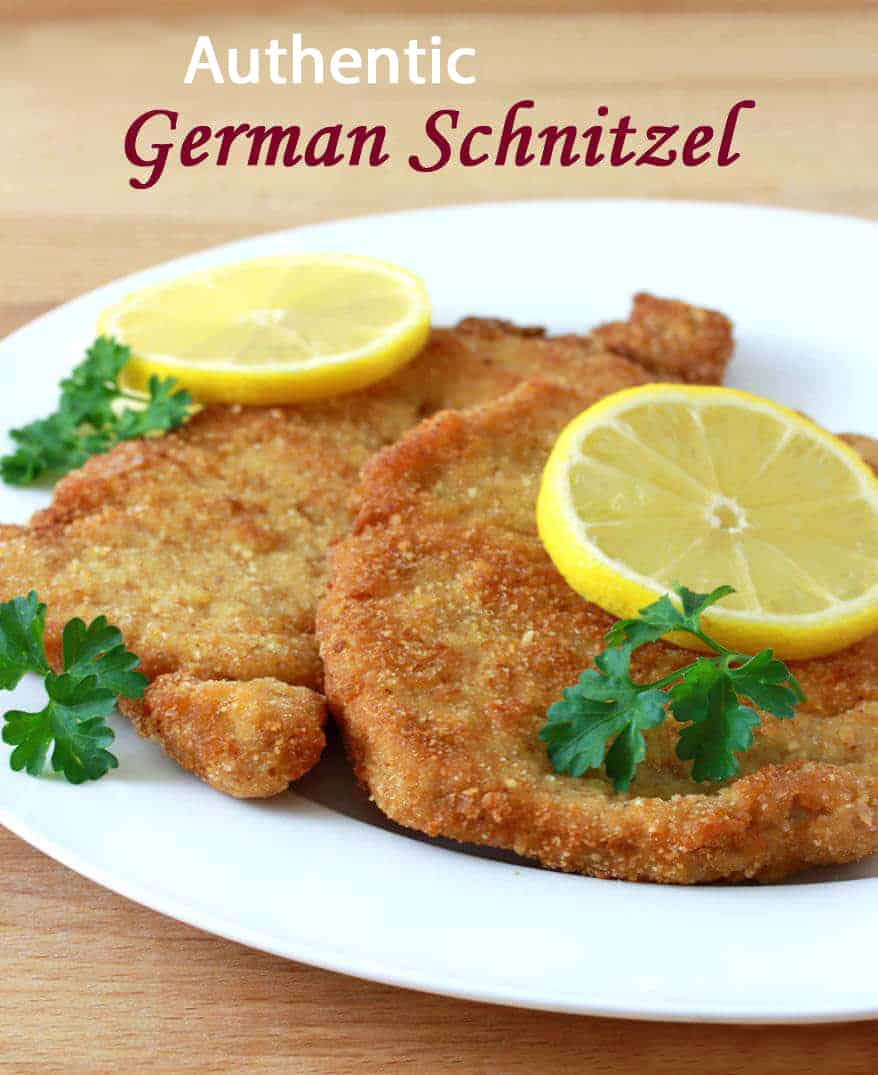
Being from Germany and as much as I love to cook, it would be unforgivably inexcusable, a total outrage, if I didn’t know how to make Schnitzel! After all, it’s one of the most quintessential German dishes. Practically every tourist to Germany has had Schnitzel and most fall in love with it.
Schnitzel vs. Wienerschnitzel: What’s the Difference?
Many people associate Schnitzel with Wienerschnitzel. However, “Wienerschnitzel” is actually a geographically protected term in Germany and Austria and can only be made with veal. German Schnitzel is prepared the same way as Austrian Wienerschnitzel, but the difference is that German Schnitzel, known as Schweineschnitzel, is made with pork instead of veal. As for where the Schnitzel originally came from…the technique of breading and frying thin cuts of meat is attributed to the Romans from around 1 BC. Another factual tidbit: Austrians will be the first to admit that Wienerschnitzel doesn’t come from Wien (Vienna).
But whether it’s Schweineschnitzel or Wienerschnitzel, when it’s perfectly breaded, perfectly fried, and perfectly crispy, practically everyone loves a good Schnitzel! And now you can make it – perfectly – in your own kitchen!
Variations
The most popular variations of Schnitzel are Jägerschnitzel (“hunter schnitzel”) which is served with mushroom gravy, Zigeunerschnitzel (“gypsy schnitzel”), served with a zesty bell pepper sauce, and Rahmschnitzel (“cream schnitzel”) served with a delicious creamy Rahm Sauce. All three are commonly found in German restaurants and are all positively delicious. If you love Schnitzel you have to try them all!
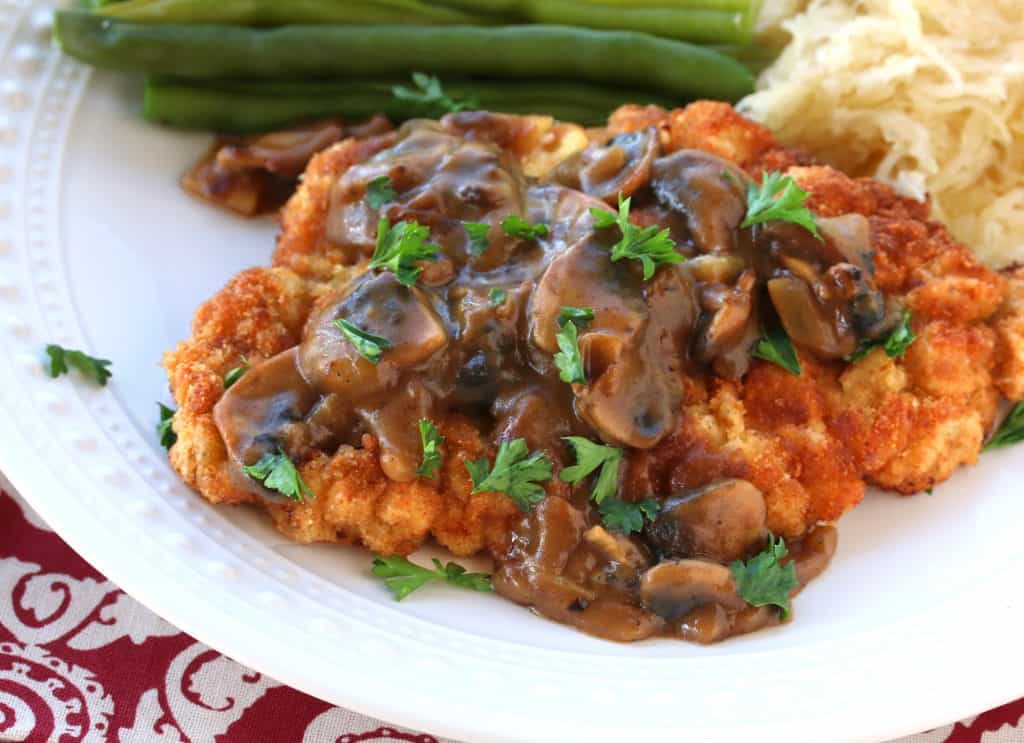
Schnitzel Recipe
Let’s get started!
Throughout the pictured recipe steps below, I’m going to share some tips and tricks with you that are important for achieving perfect results – just like the kind you get at a German restaurant.
Pro Tip 1: Pound the meat very thin, no more than 1/4 inch thick. The reason this is important is because you’ll need to fry it at high heat for a short period of time to get that perfect crispy crust without leaving the middle of the meat raw.
The easiest way to pound the pork is to lay it between two pieces of plastic wrap. Be sure to pound them using the flat side of a meat mallet. Lightly sprinkle each side with salt and pepper. Dip the pork into the flour, coating all sides.
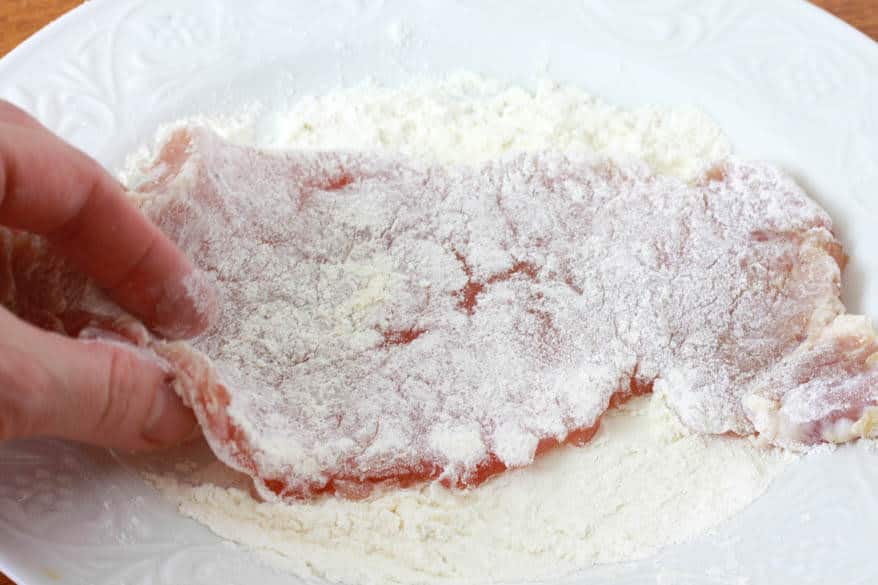
Next dip the pork into the egg mixture, coating all sides.
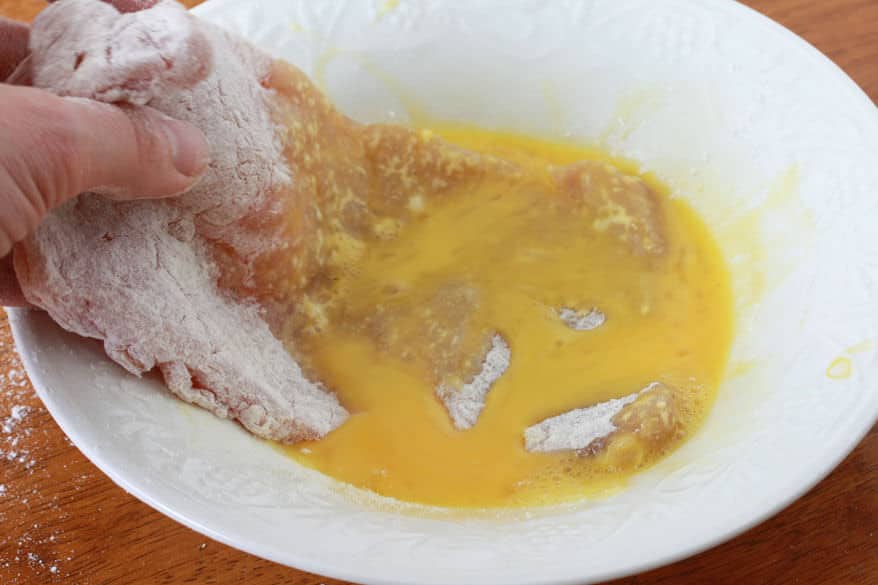
Then coat the pork with the breadcrumbs.
Pro Tip 2: Don’t press the breadcrumbs into the meat. Just softly coat the pork on both sides and all edges, and then gently shake off any excess.
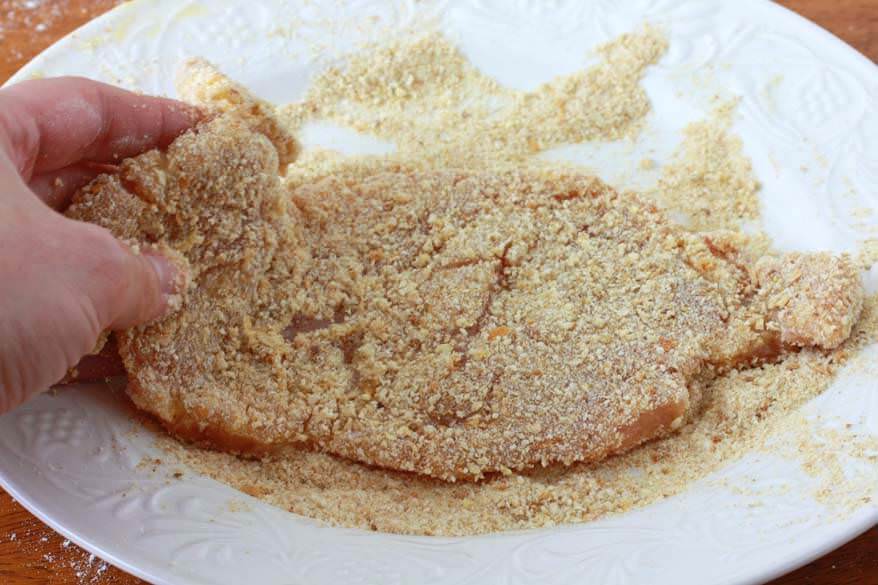
Pro Tip 3: Fry the Schnitzel immediately. Don’t let them sit in coating or the end result won’t be as crispy. You don’t need a ton of oil, but you need enough so that the Schnitzel can “swim”.
Pro Tip 4: Make sure the oil is hot enough – but not too hot. It should be around 330ºF – test it with a candy thermometer. If it’s too hot, the crust will burn before the meat is done. If it isn’t hot enough, you’ll end up with a soggy coating. When the oil is hot enough it will actually penetrate the coating less and you’ll end up with a crispy “dry” coating instead of an overly oily one. The result will be a beautifully crispy coating with a tender and juicy interior, and that’s exactly what we want.
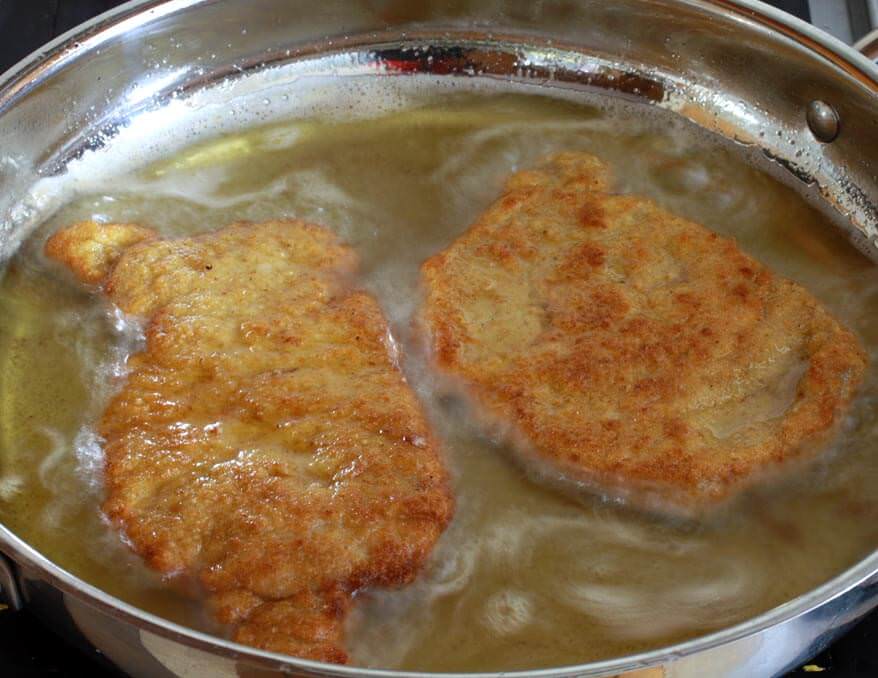
Remove the Schnitzel from the fry pan and place them briefly on a plate lined with paper towels. Transfer them to serving plates and garnish with slices of lemon and fresh parsley sprigs.
Serve immediately with French fries, Spätzle, or German potato salad and a fresh leafy green salad. See blog post below for more serving recommendations.
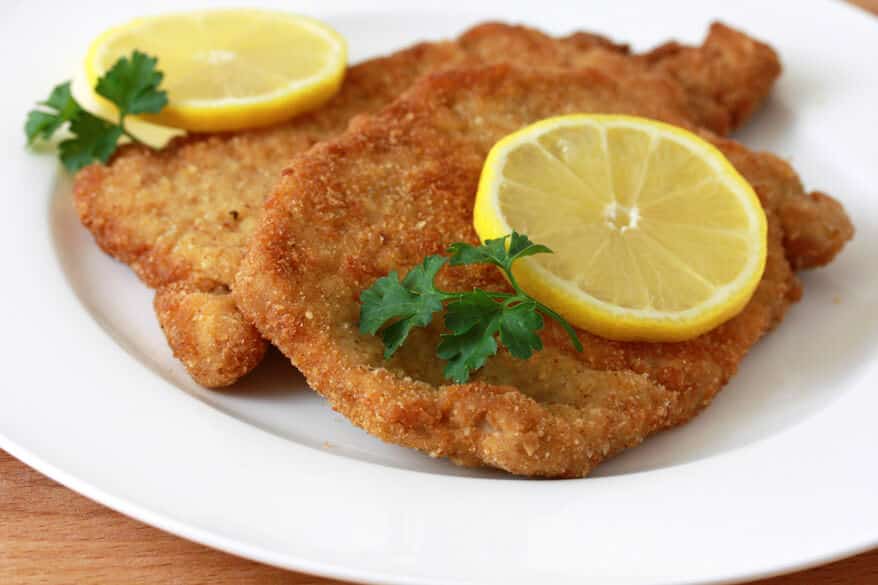
What to Serve with Schnitzel
In Germany, Schnitzel is commonly served with any of the following:
- Pommes (French fries); see my Oven Baked French Fries or Baked Potato Wedges.
- Spaetzle and gravy
- German Potato Salad
- Creamy German Cucumber Salad
- Krautsalat
- A leafy green salad
Additional serving options include mashed or roasted potatoes, Sauerkraut, Rotkohl, and roasted or steamed veggies. And if you want to pair it with some non-German sides you can serve it with classics like Creamy Coleslaw, Macaroni Salad, Classic Potato Salad, Baked Potato Wedges, Baked Beans, or Broccoli Salad.
Enjoy!
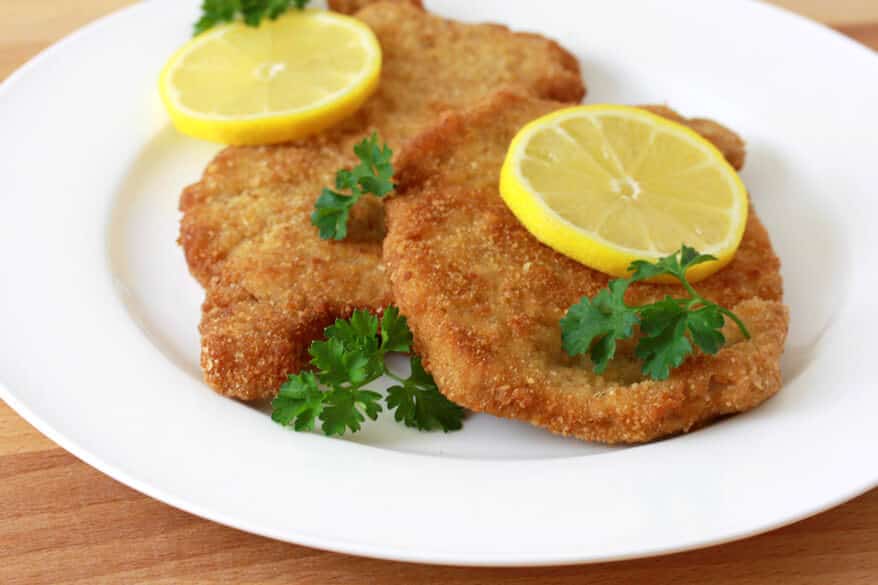
For more authentic German recipes be sure to try my:
- Sauerbraten
- Rouladen
- Schweinshaxe
- Königsberger Klopse
- Currywurst
- Käsespätzle
- Kartoffelpuffer
- Senfbraten
- Jägerschnitzel
- Maultaschen
- German Potato Soup
- Frikadellen
- German Sauerkraut Soup
Save This Recipe
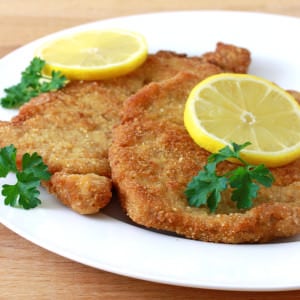
Traditional German Schnitzel (Schweineschnitzel)
Ingredients
- 4 boneless pork steaks or chops, (to make Austrian Wienerschnitzel use thin veal cutlets)
- salt and freshly ground black pepper
- 1/2 cup all-purpose flour combined with 1 teaspoon salt
- 2 large eggs, lightly beaten
- 3/4 cup plain breadcrumbs
- Oil for frying (use a neutral-tasting oil with a high smoke point)
Instructions
- Place the pork chops between two sheets of plastic wrap and pound them until just 1/4 inch thick with the flat side of a meat tenderizer. Lightly season both sides with salt and freshly ground black pepper.
- Place the flour mixture, egg, and breadcrumbs in 3 separate shallow bowls. Dip the chops in the flour, the egg, and the breadcrumbs, coating both sides and all edges at each stage. Be careful not to press the breadcrumbs into the meat. Gently shake off the excess crumbs. Don't let the schnitzel sit in the coating or they will not be as crispy once fried – fry immediately.Make sure the cooking oil is hot enough at this point (about 330 degrees F) as you don't want the Schnitzel to sit around in the coating before frying. Use enough oil so that the Schnitzels "swim" in it.Fry the Schnitzel for about 2-3 minutes on both sides until a deep golden brown. Transfer briefly to a plate lined with paper towels.
- Serve immediately with slices of fresh lemon and parsley sprigs. Serve with French fries, Spätzle or German potato salad, and a fresh leafy green salad.
Video
Nutrition
Originally published on The Daring Gourmet March 12, 2014

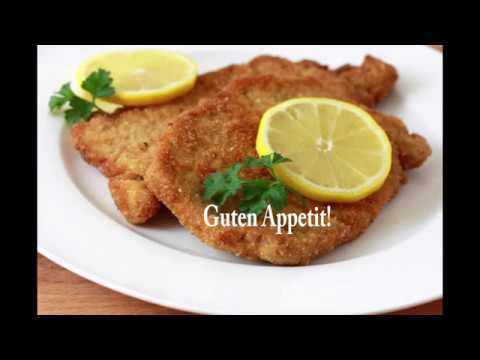


















I tried this recipe the other day unfortunately I didn’t have a mallet so my 6 year old gave me some odd looks flatting the meat with a pan lol. Huge hit both my child and husband loved it! My little one even said we ARE making this when his Grandma who grew up in Germany comes to visit this month! Thank you so much for this advice and recipe!
LOL, Meagan, that’s terrific! So glad it was a hit and hope you have a wonderful visit with Grandma! :)
I see this is an old lead but if you have any suggestions as to how to make schnitzel ahead & keep,warm & somewhat crisp I would appreciate it! Doing a large Oktoberfest part & have made schnitzel with mt Mom, Ingeborgs recipe which is identical to yours 9be t have never made in bulk, which I obviously have to do beforehand (I am talking at least 50, maybe more pieces!)
Hi Diane, keeping it crisp is what will be the challenge. If it’s for a large crowd you’re probably going to be making it far enough in advance that the Schnitzel will have to be refrigerated (as opposed to being kept warm in the oven for an hour or two after frying it), which means the coating will become moist and limp from the cold temperature and humidity in the refrigerator. The only thing I can suggest is placing the Schnitzel in the oven under high temp for a few minutes to simultaneously warm it up, dry the coating out a tad and crisp it up a bit. I’d also recommend giving that method a test run with one or two Schnitzels. Good luck and let us know how it goes!
Hi Kimberly, SOOOO glad I got attached to your pinterest sight. I have been making Schnitzel pretty much like you do for
many years (both of my parents were of German descent) but it was good to get a lesson on degree of the oil and to know
exactly the correct way. I have often made gravy by removing most of the oil and adding flour, browning it a bit and then
finishing with beef broth. I am excited to be following your recipes as all that I read sounded delicious. Thank you
Thank you, Judy, I’m equally glad you found us! :) Welcome! Yes, that’s how I make my gravy as well. And if I’m making a Jägersoße for the Schnitzel I’ll add mushrooms. Looking forward to “seeing” you around!
I’d like to make this recipe for pretzel roll sandwiches for a gathering of up to 150 people. How can I best make the schnitzel ahead of time?
That’s tricky, Lori, because the only way to get crispy Schnitzel without the breading being soft is to fry it just before serving. Schnitzel just isn’t ideal for making ahead of time. The only thing I can think of is putting the pre-cooked Schnitzel in a hot oven for a few minutes just to crisp up the coating a little before placing them on the rolls. I’d recommend doing a trial run with one Schnitzel though and see how well that works.
Thanks! I did try a trial run and it worked great!
Wonderful! Good luck with all those Schnitzel Pretzel Rolls – you’ve got your work cut out for you! But I’ve no doubt they’ll be thoroughly enjoyed by everyone present :)
This turned out really well, delicious and tender.
I’m so glad to hear it, thank you!
Mom is from Austria and taught us to make Schnitzel at a very young age. Yum Yum!
However, Mom moved back to Austria never sharing the recipe for some kind of dumpling she used to make….it was dough on the outside and fruit on the inside served with a sweet buttered breadcrumb. Any ideas of what they are called and how to make them?
Hi Sue, a couple of things come to mind: German Dampfnudeln (yeast dough balls filled with fruit preserves and often served with vanilla custard, drizzled with browned butter and sprinkled with breadcrumbs) and Szilvas Gomboc (Hungarian plum dumplings with a potato-based dough, filled with plums and rolled in breadcrumbs). Do either of those sound like it?
Kimberly you are good in trying to rewrite history, hmm? Wiener Schnitzel is from Austria and not Germany and also not from Roman times. The technique might be from there, but the combination out of meat (yes veal), the size and the way of making the panade was mentioned first time 1831 in a cookbook and there already mentioned as Wiener Schnitzel. Also historians believe it was developed out of another dish, chicken with a panade (Backhendel) which was popular already at this time in Vienna.
The popular story saying it originally comes from Milan, brought by Radetsky to the Kaiser after a battle sounds good but is simply wrong – as stated above it was mentioned in a cook book already about 20 years before (with the name Wiener Schnitzel).
Austrian cuisine is influenced a lot by neighbours – like the type of pancakes called Palatschinken or the popular meat dish Gulasch, both coming from roman times and Hungary (well I believe you know there was an Austrian-Hungarian monarchy long time ago). But as you see easily in the words, Austrians always took over the original names just slightly adopted (Gulasch, Goulash,…). There is no example to find from these times where Austrians renamed a dish. This is according to historians the strongest argument for Wiener Schnitzel beeing really Viennese and not importet although maybe influenced (as every recipe in the world builds upon existing knowledge).
Hi Andrea, you are correct and have said what I’ve already stated in my post: Wiener Schnitzel (as the name Wien connotes) is Austrian. This isn’t Wiener Schnitzel. It’s Schweineschnitzel. As I mentioned in my post, Wiener Schnitzel is strictly made with veal, that’s what sets it apart. In Germany Schnitzel is primarily made with pork. And yes, the technique, as I also point out in my post, dates back to Roman times. I’m not sure what the disagreement is here.
My daughter’s best friend is German, he’s coming by for a visit soon. I think this is the perfect thing to whip up while he’s here. It looks amazing.